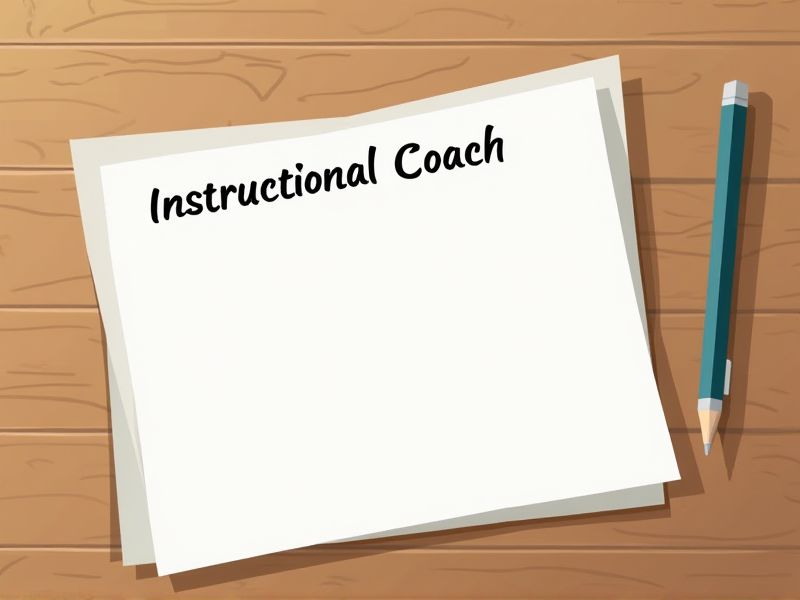
Instructional Coaches ensure effective teaching by guiding educators in refining their skills and approaches. Certifications validate their knowledge in diverse instructional strategies, enhancing their ability to support teachers. These credentials also foster credibility, enabling coaches to build trust with educational staff. Some important certifications you may need as an Instructional Coach include those related to adult education, curriculum design, and data analysis.
State Teaching Certification
State Teaching Certification for an Instructional Coach ensures a standardized level of educational knowledge and expertise. Having certification, instructional coaches are better equipped to guide teachers with evidence-based strategies. Certification requirements often include teaching experience, enhancing the coach's credibility among staff. The credential supports adherence to state regulations and educational policies, fostering a consistent learning environment statewide.
Curriculum and Instruction Certification
Curriculum and Instruction Certification equips instructional coaches with structured methodologies to improve teaching strategies. Certification ensures the coach has a comprehensive understanding of curriculum design, aligning educational standards with classroom instruction. This knowledge allows coaches to effectively guide teachers in implementing evidence-based practices that enhance student learning outcomes. Holding certification also demonstrates a commitment to professional development, which can bolster the credibility and effectiveness of an instructional coach in educational settings.
Educational Leadership Certification
Educational Leadership Certification provides instructional coaches with advanced skills in guiding and shaping educational practices, leading to improved teaching methods. This certification ensures coaches understand policy and administrative frameworks, which helps in effectively implementing school-wide instructional strategies. It equips them with the ability to analyze educational data critically, driving more effective decision-making processes. Certified instructional coaches gain credibility and authority, enhancing their influence in fostering a positive school culture and improved student outcomes.
Instructional Technology Certification
Instructional Technology Certification equips instructional coaches with the latest tools and methodologies, enhancing their capability to support educators in integrating technology effectively into the classroom. Having this certification ensures coaches are up-to-date with current digital trends and teaching strategies, which can lead to improved student engagement and learning outcomes. Schools seeking to implement technology-driven solutions often rely on instructional coaches with certification to guide the transition, minimizing resistance and challenges. Certified coaches can also provide professional development workshops, fostering a tech-savvy teaching environment that aligns with educational standards.
Data-Driven Instruction Certification
Data-Driven Instruction Certification equips instructional coaches with the skills to analyze and interpret student data effectively. This proficiency enables them to identify learning gaps and tailor instructional practices to meet diverse student needs. When coaches apply data insights, they enhance teacher capacity in developing targeted lesson plans, fostering improved student outcomes. Certification ensures that instructional coaches have a standardized understanding and capability in implementing best practices across educational settings.
Professional Learning Community (PLC) Facilitator Certification
Instructional Coaches often guide teachers' professional growth; a PLC Facilitator Certification equips them with structured strategies to lead these initiatives effectively. This certification ensures coaches can foster productive collaborative environments, enhancing teacher performance and student outcomes. It also provides credibility, signaling that a coach has undergone rigorous training to support educational development. A PLC Facilitator Certification aligns coaching efforts with current educational standards, making instructional support more relevant and impactful.
Differentiated Instruction Certification
Differentiated Instruction Certification equips instructional coaches with strategies to tailor learning experiences for diverse student needs. This knowledge enables coaches to guide teachers in implementing effective practices that improve student engagement and learning outcomes. School districts aim to foster inclusive education, which increases the demand for certified professionals. Certification also enhances the credibility and effectiveness of instructional coaches, which leads to improved teacher performance and student success.
Assessment Literacy Certification
An instructional coach equipped with assessment literacy certification can effectively interpret and utilize data to guide teacher development. This certification ensures that coaches can provide informed feedback, enhancing instructional strategies aligned with student outcomes. Coaches with strong assessment literacy are more likely to identify areas for improvement and facilitate targeted interventions. By fostering a data-driven culture, such coaches contribute significantly to consistent and measurable academic progress within schools.
Coaching and Mentoring in Education Certification
Coaching and Mentoring in Education Certification equips instructional coaches with the skills needed to effectively support and develop teachers' capabilities. The certification ensures coaches have a comprehensive understanding of pedagogical strategies and methodologies. Acquiring this certification can enhance credibility, making instructional coaches more adept at fostering a positive learning environment. These programs provide tools and techniques that directly impact teacher performance and student outcomes.
Change Management in Education Certification
Instructional coaches encounter frequent curriculum updates and need structured change management skills to implement these smoothly. Effective change management training equips them with strategies to handle resistance from educators and students alike. This certification enhances their ability to support teachers in integrating new instructional methods. Improved change management leads to more successful adoption of innovative teaching practices, benefiting overall educational outcomes.
Summary
As an instructional coach, earning certifications can enhance your professional credibility and open doors for career advancement. This formal recognition of your skills can lead to increased confidence and effectiveness in your coaching role. Schools and districts may be more inclined to rely on your expertise for teacher development programs. Consequently, you may witness improved teacher performance and student achievement within your educational environment.
